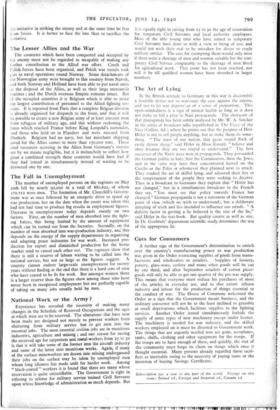The Art of Lying
In the British attitude to Germany in this war is discernible a laudable desire not to over-state the case against the enemy, and not to let war deprive us of a sense of proportion. This open-mindedness is a sign of mental health as long as it does not make us fall a prey to Nazi propaganda. The character of that propaganda has been subtly analysed by Mr. W. A. Sinclair in the series of broadcast talks republished in The Voice of the Nazi (Collins, 6d.), where he points out that the purpose of Herr Hitler is not to tell people anything, but to make them do some- thing. " The mass of our nation, that great stupid flock of easily driven sheep," said Hitler in Mein Kampf," believe and obey because they are too stupid to understand." The first successes of the Nazis were won in propaganda. They persuaded the German public to hate, first the Communists, then the Jews, and in the same way later they concentrated hatred on the Czechs or the Poles or whomever they planned next to attack. They studied the art of skilful lying, and adjusted their lies to the temperament of the people they were seeking to deceive. Thus in a broadcast to Germans they explain that " Hitler has not changed," but in a simultaneous broadcast to the French they say, " You must see that policy towards France has changed." German propaganda is not a statement of the German point of view (which we wish to understand), but a deliberate mingling of truth and lies intended to influence our minds. " A definite factor in getting a lie believed is the size of the lie," said Hider in the text-book. But quality counts as well as size. In Dr. Goebbels' department scientific study determines the use of the appropriate lie.






























 Previous page
Previous page